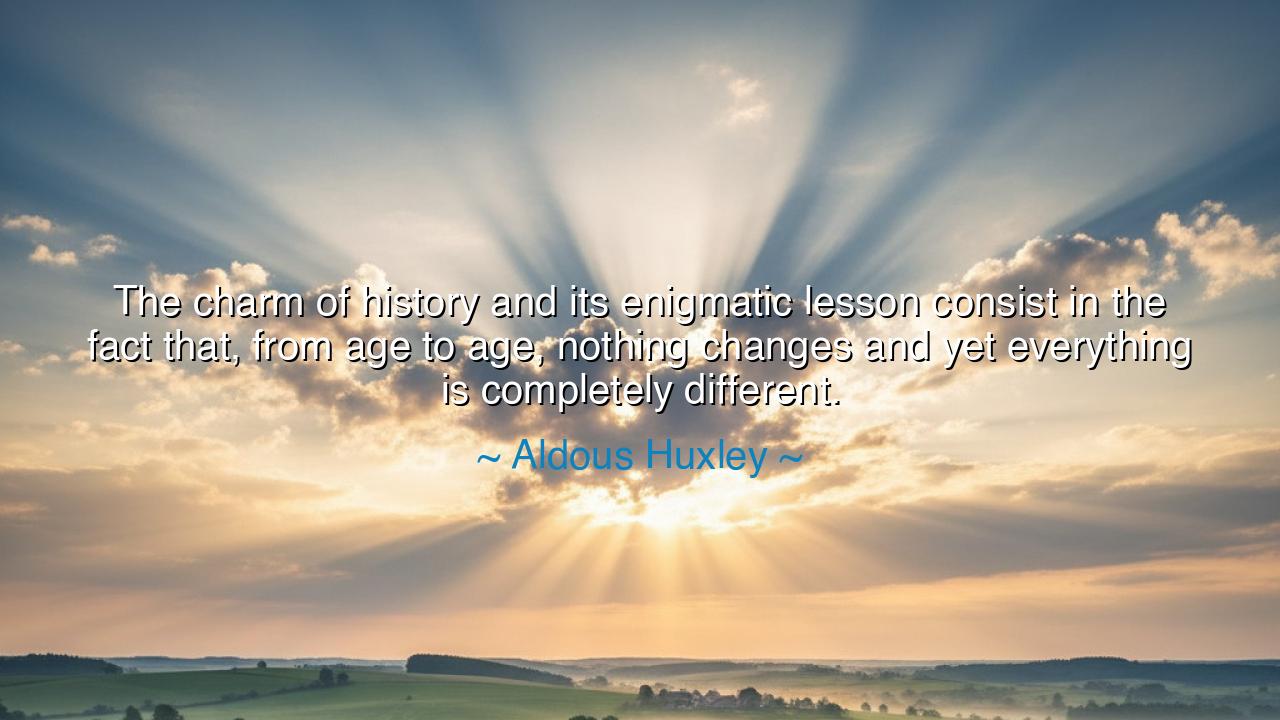
The charm of history and its enigmatic lesson consist in the fact
The charm of history and its enigmatic lesson consist in the fact that, from age to age, nothing changes and yet everything is completely different.






Harken, O children of the future, to the words of Aldous Huxley, whose insight into the course of history is a reflection of the eternal dance between the unchanging and the ever-changing. He said, "The charm of history and its enigmatic lesson consist in the fact that, from age to age, nothing changes and yet everything is completely different." This statement, though simple in form, carries with it the profound truth that history does not merely repeat itself, but flows like a river—its course is set by eternal forces, yet the waters that carry it are always fresh and new. The lives we lead, the civilizations we build, are shaped by ancient truths, and yet every age, every moment, reveals a new face of humanity, as culture, technology, and spirit evolve.
In the ancient world, the greatest thinkers and sages often observed that the human condition was constant: the struggle between virtue and vice, the quest for wisdom, the battle for peace, the hunger for truth. These struggles, these desires, have always been with us, ever since the first dawn of civilization. The Egyptians, in their wisdom, understood that time was cyclical, and that the same gods and forces that ruled their world in ancient times would continue to shape the world of the future. The great philosophers of Greece—Plato, Aristotle, Socrates—taught that the pursuit of justice and wisdom was timeless, that the virtues of the soul were as relevant in their age as they would be in any age that followed. Their teachings, though grounded in their time, continue to influence us today, just as they did in the days of their greatest followers.
Yet, despite these unchanging truths, the world of each age is completely different. Consider, O children, the rise and fall of empires, the shifting of political systems, and the development of technology. The great civilizations of Rome and Greece built upon the foundations of their ancestors, yet their worlds were different—shaped by new ideas, new ways of life, and new challenges. The rise of the Roman Empire, though rooted in the ideals of earlier societies, was marked by a vast network of roads, military conquest, and an expansive empire that stretched from the sands of Egypt to the mountains of Britain. The world of the Renaissance brought with it a rebirth of knowledge, a rediscovery of the ancient texts, but also a new spirit of individualism and artistic expression. Despite the unchanging nature of human desires and ambitions, each age brings forth its own unique contributions, and its own unique struggles.
In the modern world, we see these same patterns unfold, though the tools have changed, the methods have evolved, and the world we inhabit is vastly different from that of the ancients. The technological revolution has altered the very fabric of our lives, yet the human spirit remains unchanged. The struggles we face—poverty, inequality, violence, and the quest for peace—are not new, but the ways in which we engage with them are different. Huxley’s insight reminds us that although our circumstances may shift, the patterns of life, the fundamental truths about human nature, remain the same. The charm of history is in this paradox: we see ourselves in the ancient stories of our ancestors, and yet we are shaped by the innovations and challenges of our own time.
Consider the story of Mahatma Gandhi, whose life in the 20th century echoed the struggles of countless others who fought for freedom and justice. Gandhi's non-violent resistance was born out of the age-old teachings of truth and compassion. Yet, his methods, his approach, and the very social context in which he worked were products of his time. His struggle against British colonial rule was not just an echo of past revolutions, but a new way of confronting injustice, one that challenged the dominant power structures of the day. In his actions, we see that while the desire for freedom and self-determination is eternal, the methods through which we achieve them evolve with each generation.
Thus, the lesson is clear: history is not just a record of events, but a living testament to the eternal nature of the human spirit. As Huxley reminds us, though the world around us may change in ways we can scarcely imagine, the heart of humanity remains steadfast in its pursuit of the same truths, virtues, and challenges. In every age, we see new faces and new forms of struggle, yet beneath these surfaces, the essential nature of the human journey remains the same. The wise know that to understand the present, one must understand the past—not as something fixed and unchanging, but as a mirror through which we can see the eternal patterns of the soul.
Therefore, O children of the future, take this truth into your hearts: change is inevitable, but truth is eternal. While the world around you may shift and evolve, remember that the struggles, the virtues, and the wisdom that have shaped humanity will always remain. Look to the past not as a place of nostalgia, but as a guide to understanding the patterns of your own life. Learn from the ancients, but do not be bound by them—create your own path, shaped by the lessons of history, but infused with the innovation and challenges of your own time. As you walk forward, know that although everything may change, the essence of what it means to be human remains a constant, timeless journey.






AAdministratorAdministrator
Welcome, honored guests. Please leave a comment, we will respond soon